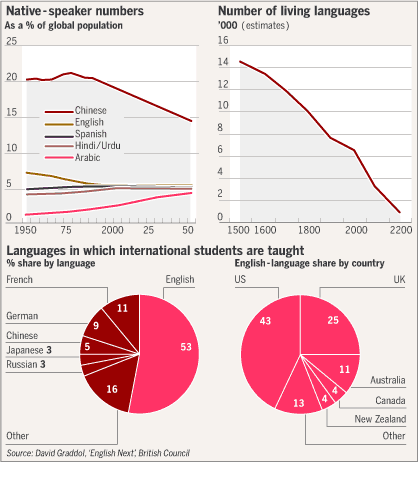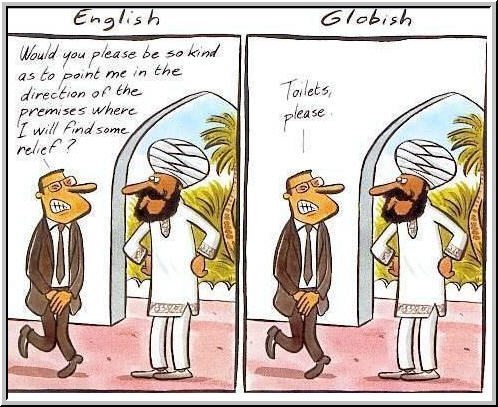
I started another debate yesterday after saying
that English is the global language.
It is.
It is not the largest spoken language –
that’s Mandarin Chinese – but it is the largest global language spoken across
borders thanks to the internet.
English is spoken as a second or foreign
language by an estimated 950 million people worldwide, whilst another 427 million
are native speakers of English.
That’s 1.4 billion people, most of whom are talking across borders as they use the international
language of English.

Source: the Financial Times
I always remember Nicholas Negroponte of
MIT saying that Chinese would replace English as the dominant global language
by 2008:
“In the same way, English will continue to
be the air traffic control language of the Net 10 years from now”, Nicholas
Negroponte, Wired Magazine, November 1997
This was picked up in various adverts by
Arthur Anderson, now Accenture, and was widely believed to be true back then.
In 2012, the fact is that he was wrong.
English is the global language.
But it’s not necessarily English.
In China, it’s Chinglish; in Germany, it’s
Ginglish; in Poland, it’s Pinglish; and in France, it’s French (excuses à tous mes amis en France).
The thing about English is that it has
spread like fury across borders thanks to this internet age.
This has led to it becoming the language
used to speak across nations. As the
Financial Times reported a few years ago:
“It is not just that Microsoft, Google and Vodafone conduct their business in
English it is the language in which Chinese speak to Brazilians and Germans to
Indonesians.”
So everyone is speaking English to break
down borders.
This is how English had its origins.
I always remember reading a book when we
celebrated the dawn of this millennia called The Year 1000: An Englishman's Year.
The book talks about life in Britain 1,000
years ago, and has many interesting illuminations.
For example, people were as tall then as we
are today, if not taller.
We always think of historical ancestors as
being smaller than us, but that was only during the Medieval period when diets
got shot to pieces.
1,000 years ago, people ate very healthily
– fresh meats and vegetables, freshly cooked – and so they were tall.
In the book, the bit I remember best is how
English came around.
Apparently, England was inhabited by many
nations 1,000 years ago. The Vikings had
invaded much of the Northern region, the French the south, and we had Dutch and
Germans across much of the country.
A truly multiracial country (not much
changed there then!).
The issue was that none of the guys could
talk to each other so they created a new language, English, to enable
multiracial communication.
The language created very basic words of
one or two syllables to describe things and, for this reason, it is why we
often have multiple ways to refer to an object.
Apparently, at the time, there were no
complex words. These all came into our language
over time from France.
So if you find words of three syllables or
more – sophistication, complexity, anamorphosis – then it typical comes from
France.
Equally, no-one swore at each other back
then. You could only swear by or on
something, but not at anything.
All the swear words came from the Dutch.
Thanks, my Netherlands friends.
Obviously, the stem of all these language
variations came from the origins of the global language base – Greek and Latin
– but English made the language simple for cross-border communication a
thousand years ago.
It is the reason why basic English should
be easy to learn and also why basic English delivers the most powerful
speeches.
“I have a dream” and “we shall fight them
on the beaches” all use the most basic forms of English – one or two syllable
words – and convey their meaning far more powerfully as a result as they appeal
to the most base human emotion and communication.
English then became the base of today’s
global language thanks to Empire building.
If the British had not had battles and won,
if they had not colonised and grown globally as a dominant Imperial power, then
English would not be the global language.
It would be French or Spanish.
But English has become the global language
base thanks to those historic events.
But it is not English, as mentioned, but variations
of English that French businessman, Jean-Paul Nerriere, calls Globish.
Globish – not a nice word, merci Jean-Paul – is Global English.
Global English is a stripped down version
of English using the base, root words, and enables acts as a common language, a
lingua franca, between non-native speakers.

A French designer might communicate with
his Japanese client in global English, for example.
Will this remain the case in the future, particularly
when China becomes the largest global economic power?
Yes, according to Manoj Vohra, Asia
director at the Economist Intelligence Unit.
He says that it is unlikely that Mandarin will rival English as even companies in
China, who prefer to operate in Chinese, are looking for managers who speak
both Mandarin and English if they want to expand abroad.
Vohra believes the future of English is not
a question of whether it will be overtaken by Mandarin, but whether it will
co-exist with Chinese, and believes bilingualism will triumph.
So, if you want to be truly capable of dealing
with global business in the future, you better learn some Chinglish.

Chris M Skinner
Chris Skinner is best known as an independent commentator on the financial markets through his blog, TheFinanser.com, as author of the bestselling book Digital Bank, and Chair of the European networking forum the Financial Services Club. He has been voted one of the most influential people in banking by The Financial Brand (as well as one of the best blogs), a FinTech Titan (Next Bank), one of the Fintech Leaders you need to follow (City AM, Deluxe and Jax Finance), as well as one of the Top 40 most influential people in financial technology by the Wall Street Journal's Financial News. To learn more click here...

